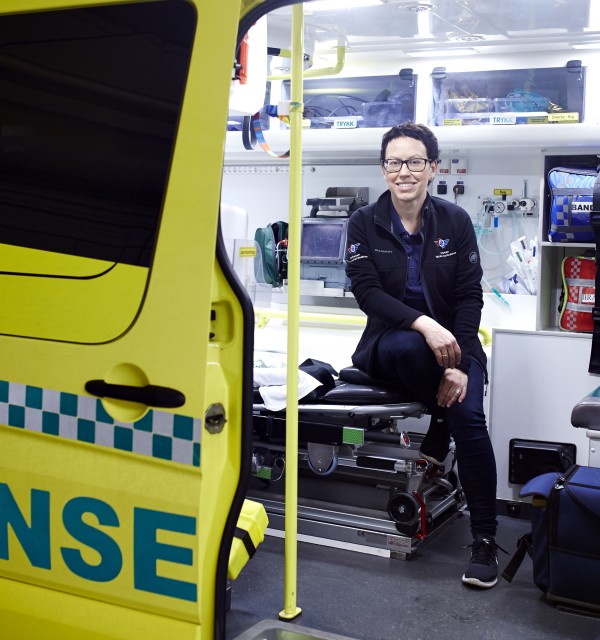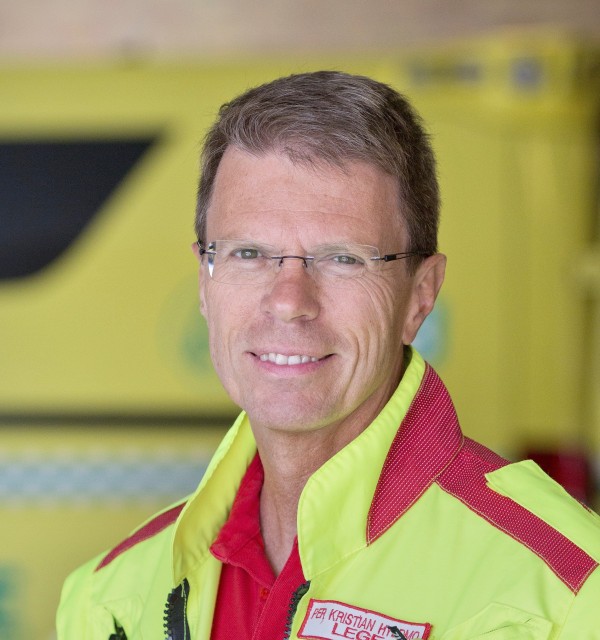The demand for quality in prehospital services is increasing. At UiS, we offer an interdisciplinary master's programme for health care professionals in prehospital emergency care and medicine.
2 years, full-time
120
10
English
August
Full-time programme is not open for admission in 2024. Find part-time programme.
About the programme
Hospital structures change, the transport distances increase as the patient is sent directly to sufficiently competent hospitals, and more advanced treatment is applied in the prehospital phase. The evidence base for various prehospital treatments is challenged. Therefore, there is an increasing emphasis on and demand for quality in prehospital critical care.
One aim of the programme is to supply prehospital care providers with academic ability to critically appraise the knowledge base in their field. This programme is the only international master in Prehospital Critical Care (PHCC), and the teaching language is English.
- Do you want to develop yourself as a critical care provider?
- Do you need more insight in pre-hospital research and development?
- Do you want to develop your analytical and diagnostic abilities?
- Do you want an International Master’s degree in Prehospital critical care?
- Do you want to study in a multidisciplinary environment?
The programme is either full-time with an estimated duration of 2 years, or part-time with an estimated duration of 4 years. New admissions will take place annually, starting every fall semester. The PHCC part-time programme is flexible and accessible for participants who work full time. Admission to the full-time programme may qualify for a Norwegian study permit.
There are no similar programmes in Norway or Scandinavia, and it is the only international master within this field. The programme was developed in collaboration with the Norwegian Air Ambulance Foundation (SNLA) and the University of Stavanger.
I was graduated in Bachelor of Nursing and have been working as a nurse and paramedic. This program was the best fit to my experience and my prospects, and UiS was actually the only university which offers Master of prehospital critical care.
Career prospects
With a master's degree in Prehospital critical care, you qualify for different positions within prehospital and emergency medicine/critical care, e.g.:
- system development
- dissemination of knowledge
- positions requiring the ability to initiate, develop and evaluate research and quality improvement projects
Further education
The program qualifies for admission to the Ph.D. program in health and medicine at the University of Stavanger.
I combine my job as an ambulance worker with doctoral studies at the Norwegian Air Ambulance.
Frequently asked questions
Please find answers to several FAQs below. If you still have questions, feel free to contact us.
Are there tuition fees or other costs?
The Norwegian Government has decided to introduce tuition fees for international students coming from outside of EU/EEA from the academic year 2023/2024. Tuition fee for Master in Prehospital Critical care 2024/2025: 180,000 NOK per academic year (60 ECTS).
- Tuition fees for international students
- Tuition fees for the academic year 2024/2025
- Exemptions from tuition fees
All students must pay a semester fee of NOK 825 (subject to change).
Does the University of Stavanger offer funding?
The university does not offer funding for undergraduate or Master level postgraduate degrees. The majority of Norwegian students are self-funding their degrees, as students normally take up student loans through the Norwegian government’s student loan agency Lånekassen.
Is this master offered as a distance learning program or on campus?
The courses are organized in either 3-day seminars or 1-week seminars, and most courses has an 80% attendance requirement. The number of seminars per course or semester will vary from semester to semester.
What kind of teaching methods do you use, and is clinical practice a part of the degree?
The course teachers use a number of different teaching methods, including lectures, Zoom webinars, simulation exercises and written assignments. Teaching methods will vary, depending on the course. The master does not offer clinical practice courses, the focus is on academic skills as it aims to provide students with the tools to critically appraise the knowledgebase in their field, and develop skills for quality and competence improvement.
Will I need to move to Stavanger?
The master is offered a full-time program and a part- time program. It’s not required for full-time students to live locally, but it’s highly recommended. Current part-time students live and work across Europe, and travel to Stavanger for seminars.
Please note that non-EU/EAA students must be full-time students to qualify for a study permit. More information regarding study permits is available at the Norwegian Directorate of Immigration’s website, or here.
How do I apply?
You apply and upload your documentation at the Søknadsweb application portal. Find more information here.
What happens if I miss the application deadline?
If you miss the application deadline, the university will not consider your application and you will have to apply next year as a rule. If there are available places at the program after we have sent out offers (normally in May/June), however, we will open for new applicants. If you miss the deadline, stay tuned to our website for updates regarding available places.
Is the part-time program open for students living in non-EU/EAA countries?
International students can apply to both the part-time program and the full-time program. Part-time students do not qualify for a study permit, so it must be possible for you to travel to Stavanger for seminars.
Admission requirements
Applicants must have completed either a Medical degree (physician) or a bachelor's degree in nursing or paramedic. Applicants must also have at least two years post-qualification experience (full-time) in prehospital emergency care.
Other applicants may be considered if they have at least five years of full-time working experience in prehospital emergency care and minimum 60 ECTS in paramedic sciences or equivalent study programmes.
Important information
All applicants to the Master in Prehospital Critical Care (both local and international) have to apply between 5 January and 5 February.
Contact
For inquires regarding admission to this programme, send an email to masteropptak@uis.no. Apply through Søknadsweb
Student life in Stavanger
Contact
Department of Quality and Health Technology
About the programme:
Per Kristian Hyldmo, programme director
General inquiries
Katrine Maritvold, helsefag@uis.no




